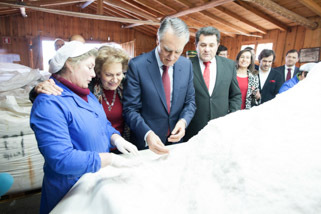
The law that approved the revision of the Charter of the Azores which I had vetoed was confirmed by Parliament on 19 December without any alterations.
That is, the majority of members of Parliament did not accept the two objections which I had raised.
It is extremely important that the people of Portugal realize what is at issue in this procedure.
This is not an issue concerning the current President of the Republic.
It isn’t even an issue of greater or lesser relevance in regional autonomy.
The supreme interests of the Portuguese State are being placed at issue.
The Charter now approved by the Parliament of the Republic introduces a very serious precedent: it restricts, by ordinary legislation, the exercise of the political competences of the President of the Republic written into the Constitution.
In accordance with the directive introduced in the Charter, the President of the Republic is from now on subject to greater requirements in the case of the dissolution of the Azores Parliament than in the case of the dissolution of the Parliament of the Republic.
Constitutionally, the Parliament of the Republic may be dissolved by the President of the Republic after hearing the political parties represented therein and the Council of State.
To dissolve the Azores Parliament the President of the Republic will now have to hear, in addition to the political parties therein represented and the Council of State, the Regional Government of the Azores and the Azores Parliament itself.
This is a totally absurd solution, as was underlined by eminent jurists.
But the absurdity is not at an end.
The situation now created cannot ever be corrected by members of Parliament.
Any other Parliament which may be called upon, in the future, to again review the Charter will be prohibited to correct what has now been approved.
And this is because a provision has been added to the Charter which prohibits the Parliament of the Republic to alter directives which have not been subject to a proposal from the Azores Parliament.
The meaning of this is that the Parliament of the Republic approved a provision in accordance with which future members of the national parliament will only be allowed to alter directives which members of the regional parliament want altered.
The powers of the members of the Parliament of the Republic have been mortgaged for ever.
As I previously said, no issues are in question which concern the current President of the Republic.
The Azores Parliament was never dissolved during 30 years of autonomy and I cannot foresee that any reasons will arise for it to be dissolved in the future.
It is the principle which is at issue, as well as the safeguard of the essential bases of our political system.
And it is not just a juridical/constitutional issue. It is far greater than that.
What is also in question is an issue of loyalty in the relationship of sovereign bodies.
Can it be normal and correct that a sovereign body imposes on the President of the Republic how he should exercise the powers conferred upon him by the Constitution?
Can it be normal and correct that Parliament imposes a given interpretation of the Constitution for the exercise of Presidential powers?
It is for this reason that the precedent now created, limiting the powers of the President of the Republic by ordinary legislation, impairs the balance of powers and affects the normal operation of Governmental bodies.
The exercise of the constitutional powers of the President of the Republic cannot be contingent upon ordinary legislation approved by majorities existing at any given moment.
Why didn’t Parliament alter the Charter in spite of the appeals that it should do so, arising from so many different quarters which considered as correct the objections of the President of the Republic?
And especially so, when the thinking of politicians should be concentrated on the resolution of the grievous issues that affect people’s lives?
Many opinions were heard that pointed towards mere party political reasons for the decision taken by the Parliament of the Republic.
From the analysis of behaviour and assertions made throughout the process, and from private information which I received, few doubts remain as to this issue.
And, such being the case, the quality of our democracy has suffered a serious setback.
In the terms of the Constitution, if Parliament confirms a law vetoed by the President of the Republic, the latter should enact it within an 8 day delay.
As such, I enacted today the Political and Administrative Charter of the Azores.
I promised to obey the Constitution and I honour my word.
But nobody will ever be able to say that, faced with the grievous precedent created by the Charter of the Azores, I did not do everything within my reach to defend the supreme interests of the State.
Nobody will ever be able to say that I did not do everything within my reach to hinder momentary party political interests to overlap supreme national interests.
As President of the Republic I did, in conscience, what I should have done.
© 2006-2016 Presidency of the Portuguese Republic
You have gained access to the records of the Official Site of the Presidency of the Republic from 9 March 2006 to 9 March 2016.
The contents available here were entered in the site during the 10 year period covering the two mandates of President of the Republic Aníbal Cavaco Silva.